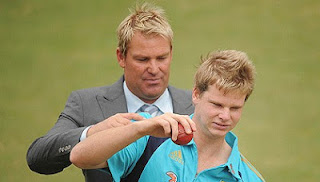Flintoff was Man of the Series in the 2005 Ashes, no mean feat considering the contributions of his teammates with the bat (e.g. Pietersen, Trescothick) and ball (e.g. Jones, Harmison, Hoggard). His contributions with bat and ball, however, were often at crucial times and his ability to inspire teammates with these efforts were key to England winning.
Thus, Cricket Australia decided it needed an all-rounder in its own team to replicate the success of England. Interesting in that it didn't look to rid itself of some of the players that were past their prime, or start developing new players, but that's another story.
The stand-out candidate for the all-rounder position at the time was Shane Watson, who had debuted 6 months prior in Sydney as a bowling all-rounder. Watsons' highlight from his first test would have to be either his first wicket (Younis Khan LBW) or falling over during his first over.
His efforts against a mediocre Pakistan were satisfactory, though not enough to earn a place in England.
The only other all-rounders in consideration were Andrew McDonald, who didn't have Watsons abilities with the bat, and Andrew Symonds, whose medium pace wasn't threatening enough and whose part-time spin was already being misrepresented by a fleet of others.
 |
| Not naming names. |
His next chance came courtesy of Flintoff in the 2009 Ashes, after the English bowler worked out that Phillip Hughes (the incumbent Australian opener) couldn't play the short ball, leaving Australia in desperate need of an opener.
With no other batsman available, Watson was asked to open the batting, as well as help out with the bowling. Being a good cricketer with good technique, Watson did well in the role; leaving balls outside off and driving and pulling anything too straight or short. His shot-limitations didn't seem to limit his success and he cemented his place at the top without ever making a big score.
 |
| "Thanks!" |
I had never seen so much celebration regarding an Australians test century before. Times were obviously tough.
Since then, Watson went on to win the Alan Border medal for best player of the season, and has been one of the best in the team since; when fit to play.
And herein lies the issue: Watson has been a very good player in a very poor team and so has been asked to, and has volunteered to, play out-of position and as often as possible. This has resulted in considerable injuries and disruption to the team.
Flintoffs own career was ultimately ended by injuries, though these were more caused by the spinal issues that fast bowlers face. While Flintoff did play in some unsuccessful teams initially, he was a crucial part of several Ashes-winning sides that lifted the profile of his sport and the morale of his team.
So while Watson may have Flintoff to thank for convincing Cricket Australia to include him in the side, he may want to ask Andrew if he can give CA a call to convince them to manage his workload better.
No comments:
Post a Comment